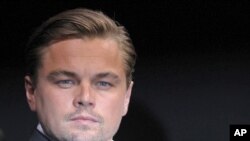Leonardo DiCaprio is one of the world's most popular movie stars. His films, including Titanic, The Aviator and The Departed have grossed almost $5 billion worldwide. But the actor is trying to use his celebrity status to do more than sell tickets. Alan Silverman has a look at DiCaprio's off-screen commitment to the environment.
In his new film J. Edgar, Leonardo DiCaprio stars as J. Edgar Hoover, famous for making the FBI into a world-renowned law enforcement agency and infamous for the files he kept on Americans both in and out of power.
"Is that legal?"
"Sometimes you have to bend the rules a little in order to keep your country safe."
"It's interesting in this day and age to do a film about political espionage and wiretapping," notes DiCaprio. "I don't think those types of secrets that J. Edgar Hoover was able to obtain and keep would be possible in today's world. With the Internet and 'Wikileaks' it doesn't seem that those types of secrets can be kept for that long a period of time."
It's no secret, though, that DiCaprio is a committed and vocal environmental activist. More than a decade ago he inspired a Hollywood trend by becoming the first among his peers to start driving a fuel-efficient hybrid car.
"I think that every car should have that technology," DiCaprio says. "It really has dramatically less emissions and, not only that, the gas mileage is unbelievable. If we have the technology to make every car like that - and we should - we would reduce our dependence on oil, foreign and domestic."
DiCaprio says he's been fascinated by nature ever since he was a child growing up in smog-choked Los Angeles.
"I actually wanted to be a marine biologist when I was very young. That was a great passion of mine, so I suppose in the off-season when not making movies, I became more and more active as an environmentalist and tried to be more vocal about issues that I felt were important," he explains.
The Leonardo diCaprio Foundation, established in 1998 to promote a sustainable future, has been active in issues ranging from eliminating plastic grocery bags to ending shark-finning, the brutal practice blamed for a steep decline in shark populations around the world.
"Right now, the campaign that I'm a part of is to save the last remaining wild tigers throughout Asia," explains DiCaprio. "There are only 3,200 left in the wild. There are more Asian tigers in cages in Texas than there are tigers in the wild and we are at risk of losing this iconic species for all time."
At an Asian tiger summit in Moscow last year, DiCaprio personally donated $1 million to a program for protecting habitat as well as wildlife.
"Throughout Asia, a lot of countries are selling off jungle and forest rights for palm oil and for paper and pulp companies. So it's more of land preservation effort," he explains, "because if you can unify the public behind saving an iconic species like the tiger, like they did with the panda, that means you need to protect their habitat and everything that they hunt."
DiCaprio has won acclaim for his encyclopedic knowledge of the environment and sustainability. He says he uses his movie star status to draw attention to what he considers a global concern.
"It's important to everybody," DiCaprio stresses. "I think that the environmental movement is the biggest people movement in the world."
DiCaprio also brings his environmental activism into the workplace, requiring his film projects to adopt "green" practices to prevent wasting resources.





